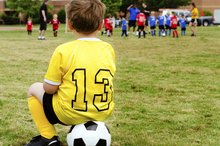What does fact checked mean?
At Healthfully, we strive to deliver objective content that is accurate and up-to-date. Our team periodically reviews articles in order to ensure content quality. The sources cited below consist of evidence from peer-reviewed journals, prominent medical organizations, academic associations, and government data.
The information contained on this site is for informational purposes only, and should not be used as a substitute for the advice of a professional health care provider. Please check with the appropriate physician regarding health questions and concerns. Although we strive to deliver accurate and up-to-date information, no guarantee to that effect is made.
Does Exercise Improve Concentration?
In addition to its general effects on physical and mental well-being, regular physical activity may be linked to improved concentration and learning abilities. Whether you wish to improve your concentration on everyday tasks, command the attention of a group of students or treat the symptoms of an attention deficit disorder, regular physical activity may help.
If you are experiencing serious medical symptoms, seek emergency treatment immediately.
Exercise vs. Extra Lessons in Children
In a 2007 report, Dr. Stewart Trost of Oregon State University links as little as 15 minutes of physical activity to improved concentration, memory and classroom behavior among elementary school students. Contrary to what may be expected, the improved concentration and academic performance were more pronounced among children who exercised than in those who had an additional lesson. As such, eliminating breaks for physical activity to fit in additional lessons may be counterproductive when teaching children.
- In a 2007 report, Dr. Stewart Trost of Oregon State University links as little as 15 minutes of physical activity to improved concentration, memory and classroom behavior among elementary school students.
- Contrary to what may be expected, the improved concentration and academic performance were more pronounced among children who exercised than in those who had an additional lesson.
Exercise and Youth Concentration
Does Playing Sports Help Improve Grades?
Learn More
Reviewing the research on the effects of physical activity on youth academic performance, Nanci Hellmich of "USA Today" supports the findings reported by Trost 1. In addition to finding that breaks for recess are more beneficial to classroom concentration than extra lessons, Hellmich reports in her 2010 article that there are no negative associations between extra time for physical activity and concentration. Drawing from a large review of the research, Hellmich reports that increasing the time that students spend in physical education classes improves attention, concentration and scores on standardized academic achievement tests.
- Reviewing the research on the effects of physical activity on youth academic performance, Nanci Hellmich of "USA Today" supports the findings reported by Trost 1.
- Drawing from a large review of the research, Hellmich reports that increasing the time that students spend in physical education classes improves attention, concentration and scores on standardized academic achievement tests.
Exercise and Adult Concentration
Mary Carmichael of "Newsweek" magazine reported similar findings in a 2007 article, finding children who performed best on fitness tests were also more likely to score highest on academic and concentration tests 2. Such effects were also found to extend to adults, with a three-month aerobic exercise program linked to the formation of new neurons and more diverse, denser interconnections between them. In addition to improving concentration and overall brain functioning, Carmichael reports that these effects of physical activity may be linked to preventing a range of cognitive and neurological disorders, including Alzheimer's disease and attention deficit hyperactivity disorder, or ADHD 3.
ADHD and Physical Activity
Activities for Adults With Developmental Disabilities
Learn More
While ADHD can manifest as a disorder of hyperactivity, inattention or a mixture of the two, problems related to concentration are common for those living with this disorder.
Related Articles
References
- "USA Today"; Study: Physical Activity Can Boost Student Performance; Nanci Hellmich; April 2010
- "Newsweek" Magazine; Stronger, Faster, Smarter; Mary Carmichael; March 2007
- National Institute of Mental Health: Attention Deficit Hyperactivity Disorder (ADHD)
- "Brain Exercises to Cure ADHD"; Amnon Gimpel; 2008
Writer Bio
Matthew Lee has been writing professionally since 2007. Past and current research projects have explored the effect of a diagnosis of breast cancer on lifestyle and mental health and adherence to lifestyle-based (i.e. nutrition and exercise) and drug therapy treatment programs. He holds a Master of Arts in psychology from Carleton University and is working toward his doctorate in health psychology.








